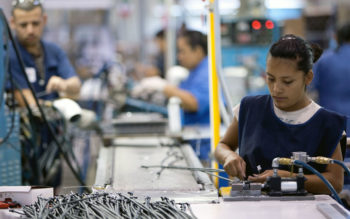
The bustling, cheap-labor assembly plants that dot the Mexican side of the US border are booming, but President Donald Trump’s stances on taxes and trade have them worried.
Trump wants to renegotiate the NAFTA trade agreement with Mexico and Canada, which has been in force for a generation, and his Republican Party has floated tax reform ideas that would hurt Mexican companies.
“Everyone is waiting to see what move the United States is going to make,” said Mario Hernandez of KPMG, a consultant for companies that run the so-called ‘maquiladora’ plants in Ciudad Juarez, across the frontier from El Paso, Texas.
These companies provide work for 2.7 million people there and in other states near the frontier. They import components from other countries, mainly the United States, assemble them — into appliances, medical equipment, auto parts and pieces for the aerospace industry — and then export them.
The system helps companies save money because labor is much cheaper in Mexico than in the US.
The sector’s output expanded its revenues from the equivalent of about $128 million in 2010 to $239 million in 2016, adding 800,000 jobs.
But alarm bells sounded in this industry in Mexico when Trump came to power in January and pledged to renegotiate NAFTA or pull out altogether if he does not win new terms that he likes.
A full 80 percent of Mexico’s exports go to the United States.
INDEX, an association that represents the maquiladora industry, says its strategy is “to be right next door” alongside Mexican officials who might end up renegotiating the North American Free Trade Agreement with the US and Canada.
Because of the uncertainty surrounding the future of NAFTA, some companies have put investment plans on hold.
Cesar Ochoa, a lawyer in Ciudad Juarez who advises companies interested in doing business in Mexico, said things have indeed been slow since the beginning of the year when Trump took power.
“I do not know if the rest of the market is in the same situation as me, but right now things are dead,” said Ochoa.
“It may be a golden age for the ‘maquiladoras’ but the only problem is that dark cloud on the horizon,” said Ochoa, insisting that companies want clearer signals from Trump as to what kind of trade ties he seeks with Mexico.
Mexico’s auto industry is also on edge about the prospect of changes to NAFTA, due to Trump’s belief that it is too beneficial to Mexico, to the detriment of Americans.
And it has no Plan B, said Raul Meyer, an auto industry expert with PwC Strategy. “Right now, I would say no. There is no specific plan for major manufacturers in this country,” he said.
AMIA, Mexico’s largest auto manufacturers’ association, says 77 percent of the 2.7 million vehicles its members exported last year went to the US. These companies include US automakers Ford and General Motors as well as Volkswagen and Nissan.
As for the maquiladoras, another thing that has them worried is a Republican Party proposal to impose what is called a border adjustment tax.
It would slap taxes on imported goods — such as from Mexico — and exempt US exports from taxation. For Republicans, among other things it is a way to help US manufacturers. Trump has yet to endorse this idea.
“This is what worries us the most because the majority of our manufacturing goes to the United States,” said Hernandez.
In theory, he said, one reaction would be for factories to relocate out of countries like Mexico or China and return to the United States.
But it would also backfire for Americans because of the vastly cheaper cost of labor in Mexico.
“The price of things would automatically rise and consumers would have to be willing to pay 15 or 20 percent more,” Hernandez said.
Copyright Ships & Ports Ltd. Permission to use quotations from this article is granted subject to appropriate credit given to www.shipsandports.com.ng as the source.
